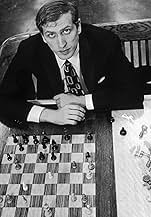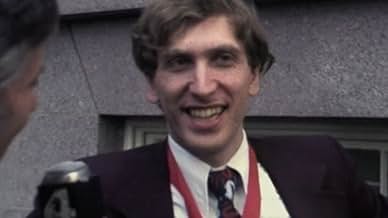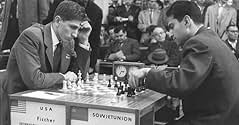Adicionar um enredo no seu idioma'Bobby Fischer Against the World' is a documentary feature exploring the tragic and bizarre life of the late chess master Bobby Fischer. The drama of Bobby Fischer's career was undeniable, f... Ler tudo'Bobby Fischer Against the World' is a documentary feature exploring the tragic and bizarre life of the late chess master Bobby Fischer. The drama of Bobby Fischer's career was undeniable, from his troubled childhood, to his rock star status as World Champion and Cold War icon, t... Ler tudo'Bobby Fischer Against the World' is a documentary feature exploring the tragic and bizarre life of the late chess master Bobby Fischer. The drama of Bobby Fischer's career was undeniable, from his troubled childhood, to his rock star status as World Champion and Cold War icon, to his life as a fugitive on the run. This film explores one of the most infamous and myste... Ler tudo
- Indicado para 1 Primetime Emmy
- 1 vitória e 5 indicações no total
- Self
- (cenas de arquivo)
- Self
- (as Dr. Anthony Saidy)
- Self
- (cenas de arquivo)
- Self
- (cenas de arquivo)
- Self
- (cenas de arquivo)
- Self
- (as Fernand Gobet PhD)
Avaliações em destaque
Chess has survived for thousands of years and is arguably the hardest game in the world. Through the eons, if there is one name or one master that has towered above anyone else, it is the American Bobby Fischer. When Fischer defeated Boris Spassky in 1972, the match created more publicity than any other chess event in history (even more than when IBM's computer Deep Blue defeated Garry Kasparov in 1996). A lone American had defeated the mighty Soviet chess machine during the cold war. What should have been just the beginning of an already great career for Fischer, it was actually just the end.
Bobby Fischer made one of the great disappearances of any famous person of the 20th century. He did not die, but was as elusive as Bigfoot after he won the world championship. For those who encountered him only would end of becoming frustrated because they realized he was slowly going insane. 20 years after winning the Championship (1992), Fischer reappeared to play Spassky for another match. When he appeared, it became even more obvious that the man had lost his mind. When the September 11th attacks happened, Fischer shocked the world when he applauded the acts on a radio program. He never played again and passed away in 2008.
This HBO program is fantastic in that it is presented in a manner that is suitable for those who barely know anything about chess or those who know the intricate details of Fischer's career and life. It keeps the viewers' attention by playing nice music in the background throughout. The program shows numerous photographs and television footage that most people have never seen. The central focus of the program is the Fischer - Spassky match of 1972, but it juxtaposes all kind of other topics such as Fischer's family and love life, and his affiliation with a cult group. The program even has Henry Kissinger talking about the match. Kissinger had encouraged Fischer to follow through with the match when Fischer was about to not show up. But, the program does not blame Fischer's religious obsession with chess for this mental breakdown. It posits that it could have been a possibility.
I will have to strongly disagree with one part of this documentary. It stated that when after Fischer won the world championship, he was arguably the most famous man in the world (aside from Jesus). I find this really hard to believe. One because Fischer was a merely just a chess champion and (2) there were many other gigantic figures at that time; Muhammad Ali, Richard Nixon, Chairman Mao, just to name a few.
In the end, the enigma will always remain the enigma. Nobody really knows why Fischer quit playing after 1972 or what caused his mental disintegration. Even though he forfeited his title to Karpov in 1975, why did he completely give up playing even tournaments and simuls altogether? What we are left is speculation. Many chess lovers will proudly proclaim that Fischer was the best player of all time. There maybe some truth to this, but I believe Garry Kasparov finally deserves this title. This is because Kasparov was willing to take on all comers, human beings or computers. Kasparov did this for almost 3 decades. Kasparov defeated an ongoing Champion Anatoly Karpov (one of the top 5 players ever) 5 times and he continued to defend this title beating brilliant and talented young players - Ivanchuck, Shirov, Topalov, Anand, Short, Leko, Kramnik, Kamsky, and so many others for another 2 decades.
*Please do not comment if you are going to get into a "greatest ever" debate - it will be yet another endless discussion and will lead to nowhere.* Fishcer's story is one of the great tragedies of chess, but in the short time that he was brilliant, he shined so brightly that it continues to illuminate to this day. Although his life ended to a sad decline, keep in mind, we remember and admire him for what he produced.
Garbus's formula is a standard one but succeeds brilliantly here. She juxtaposes archival footage and still photos (much of which, I believe, has never been shown publicly before) with contemporary interviews of many of the key players from Fischer's two-decade pursuit of the title. These individuals - fellow chess players (several of whom were his boyhood friends), tournament organizers, journalists, even his bodyguard - were all members of the small cadre of people that Bobby allowed into his life. Many were even part of his inner circle at Reykjavik. To a person, then, the interviewees were uniquely qualified to share their recollections of Bobby. But, beyond that, they had been positioned to gain some understanding of Bobby. In this film, they share that understanding, or at least their attempts at understanding, of who Bobby Fischer was, and more importantly, why he was that way.
One can only try to imagine the monumental effort required by Garbus to convince them to appear on camera. That she was even able to get Henry Kissinger (now a heavyweight in more ways than one) speaks volumes about her credibility. Kissinger's presence in the film is only one reminder of what was at stake in Reykjavik. Garbus reminds us that this was war: US versus the USSR, capitalism versus communism, freedom versus oppression, each could have been used to describe the battle. But in the end, the only one that really mattered was the title Garbus chose for her work: Bobby Fischer against the World.
Garbus filmed most of the interviews against stunning backdrops of wood-paneled libraries and polished marble floors. In that way she provides quite a contrast for some of the interviewees with their rumpled, 'haven't shaved in three days' look. By doing so, she heightens their humanity, and their humility. Bobby, by contrast, throughout the film, in his words and by his actions, only serves to confirm that he may not have had much of either.
Chess grandmasters Larry Evans and Anthony Saidy, who both knew Bobby since he was a little boy, are not just particularly articulate and insightful, but are also fonts of interesting 'Bobby facts'. Saidy tells us that when Bobby decided to camp out at Saidy's parents' home to avoid the press in the weeks leading up to the World Championship, Saidy's father was dying of cancer. "Bobby, about you staying with us, my dad is sick with cancer". "It's okay, I don't mind", replied the only slightly self absorbed Fischer.
Many of the interviews are with Europeans - Icelanders, Russians, Germans - and all reinforce how impressive it is to hear someone speak fluently in a language other than their native tongue. One has no doubts that their memories and minds must also be sharp. In this context, it is perhaps ironic that LIFE photographer and Scotsman Harry Benson's humanizing photos of Bobby, shown prominently on screen while he speaks, need no words to tell us all we need to know.
Two segments are, each, extraordinary. Saemi Parsson who was Bobby's bodyguard in Reykjavik tells the camera how, after not hearing a word from Bobby in 22 years ("not a peep"), he received the imprisoned Bobby's frantic phone call from Japan (the Japanese had detained Fischer at the request of the US). That Bobby chose to call Parsson, is not quite the correct statement. Rather, that Bobby had no one to call but Parsson seems closer to the truth. We are reminded by this episode that Bobby, by then, was not only stateless, but had severed all relationships with his family and friends. He was alone in more ways than one. The other segment is priceless and is comprised of a faded ABC Wide World of Sports TV special featuring noted sports artist LeRoy Neiman. Neiman, who expected to be "bored to pieces" by the match in Reykjavik draws Fischer as a matador skewering the hapless Spassky! But, can you imagine? ABC's Wide World of Sports? For chess? Such was the impact of Robert James Fischer.
Immediately after beating Spassky, Fischer began his life of seclusion. It may have been even sadder that he also effectively stopped playing chess at the same time, at age 29. All of us are familiar with Fischer's increasingly bizarre post-Reykjavik antics. Sometimes attributed to eccentricity, Garbus makes no secret that she believes Bobby's behaviour was a product of mental illness. Through the images and words of her film, she leaves no other way to label Bobby's paranoia and psychotic pronouncements. She puts the proof right there, in the flickering of a projector, for all to see. We wish it weren't so.
*** 1/2 (out of 4)
Another very good documentary from HBO, this one taking a look at the life and career of Bobby Fischer, the chess genius who rose to fame at an early age and really put the sport on the U.S. map when he defeated the Russian Spassky in 1972. Fischer's rise was quickly put out when he refused to defend his championship and the genius spent the rest of his life trying to hide from the public and apparently driving closer to madness. David Edmonds, Dr. Anthony Saidy, Susan Polgar, Henry Kissinger, David Shenk, Malcolm Gladwell and Larry Evans are among the many people interviewed here as they try to explain what made Fischer a genius but also what eventually got him kick out of America. This is a very fascinating documentary because it really seems to be trying to tell the truth and not just sugar-coat some rather troubled moments in this man's life. It's clear that he was a genius at the game of chess and the documentary makes an interesting choice showing other great minds of the game who ended their lives in a mental breakdown. The majority of the running time is devoted to the Spassky match as we get a game-to-game breakdown of events, shown the important matches and also the various controversies that Fischer stirred up at the time. So, in reality, even in his greatest moments Fischer was still delivering controversy and upsetting people. Fans of chess, Fischer or those just interesting in great documentaries should really be entertained by this thing. The documentary doesn't really explain the rules of chess so some might want to read up a bit before going into the film but even if you know nothing the story is just so fascinating where it really doesn't matter.
First she had to portray Fischer's complex character. Since filming started after his death, Garbus had to dig up footage—scattered around the world—and weave together the various strands of Fischer's life. Not only that, she had to gather together all those who played important role in his life.
The second critical obstacle for Grabus was that she had to depict the period where the tension of the Cold War was emerging (because of the Vietnam War), and the whole world was going through major changes, with the entire planet becoming a mortal battlefield. Although chess had started to become popular, the hostility of that time was somehow deeply reflected on the chessboard, and this was soon exploited even more, when the world of politics penetrated into the world of chess.
Garbus' third critical obstacle was that Fischer's life can be divided into three parts: i) his life (and chess career) before 1972, ii) his battle for the title in 1972, and iii) his life after 1972. This means that Fischer's life is often summarized within the boundaries of a single event, stripping away all the aspects that formed his character up to that point. How was Garbus then, going to tell the story of a man who spent half his life playing chess and then disappeared? To overcome these obstacles, Garbus chooses a nonlinear storytelling. Going back—to Fischer's childhood and early years, and then later—forward to his life after the championship games, Garbus uses the 1972 events as the spine of the story.
Visiting Fischer's childhood and adolescence, Garbus shows us his love for (and dedication to) chess, his mother's strong personality, his father's abandonment and absence, and how the precipitate publicity affected his privacy. But what no one mentions in the interviews is that Fischer, at a young age, struggled to gain the respect of others. He was a boy among men, playing (and trying to understand) their game. That struggle was slowly draining away Fischer's childhood (and transforming the first 29 years of his life to a prolonged chess game), the result of which Garbus masterfully displays—at what could be the climax of the film—when she shows Fischer, soon after he won the title, in an amusement park sitting inside a little airplane—flying towards his lost childhood.
The tense climate between the U.S. and the Soviet Union—and its echo in the chess world, is brilliantly shown by Garbus through the rare and previously unseen footage she managed to dig up. Unfortunately, Spassky is the great absentee from this documentary. Although the title of the film is Bobby Fischer Against the World (meaning that Fischer fights against everyone and no one at the same time, indicating that Fischer's whole world is nothing but chess—and Fischer himself is nothing but chess—therefore Fischer's only opponent is Fischer), Garbus mistakenly diminishes Spassky's unique and independent personality by putting him in the same basket with all the others. After all, Spassky was the final external obstacle in Fischer's road to the crown—the one guy he did not yet win. And to paraphrase Thorarinsson, "I think we can agree on the point that Mr. Spassky exists".
However, Garbus does a great job regarding the events of 1972. She leaves out, though, the drama of the two players not having similar chairs (with Fischer's chair being superior to Spassky's), but generally, she covers the events accurately enough: from Fischer's training program, his antics of not showing up, his lists of demands, his growing hatred towards the Soviets, the defending of his principles, the antipathy to cameras and photographers, to his so long-awaited win, Garbus quietly and unpretentiously illustrates the events of the 1972 summer in Iceland.
There is another level in this documentary, a hidden level that Garbus unconsciously created. All the interviewees in the film are trying to label Fischer to a degree that fits their world of understanding. They believe that Fischer should have a particular role in their world, and serve that role in a specific manner.
We are in a society where everyone needs something to have a form in order to understand it. That's why we put labels on everything, and don't let things just be. In that sense, for me, Fischer died in 1972 and reborn after that, as a man with no home and no childhood, trying to play chess on a higher level, the one we all play and eventually lose
Você sabia?
- CuriosidadesThough Bobby Fischer hated Soviet players for what he considered collusion i.e. drawing matches between themselves so they could concentrate on beating non-Soviet players like Fischer, Bobby Fischer liked and respected Boris Spassky. In turn, Spassky returned the affection and esteem.
- Citações
Larry Evans - Former Champion: Reportedly, Fischer's last words were: "Nothing is so healing as the human touch".
- ConexõesFeatured in Ebert Presents: At the Movies: Episode #1.20 (2011)
- Trilhas sonorasTheme from Shaft
Words and Music by Isaac Hayes
Published by Irving Music, Inc. (BMI)
Performed by Isaac Hayes
Courtesy of Stax Records
By arrangement with Concord Music Group, Inc.
Principais escolhas
- How long is Bobby Fischer Against the World?Fornecido pela Alexa
Detalhes
- Data de lançamento
- Países de origem
- Centrais de atendimento oficiais
- Idiomas
- Também conhecido como
- Bobby Fischer Against the World
- Locações de filme
- Empresas de produção
- Consulte mais créditos da empresa na IMDbPro
Bilheteria
- Faturamento bruto mundial
- US$ 90.511
- Tempo de duração1 hora 33 minutos
- Cor
- Proporção
- 1.78 : 1


























